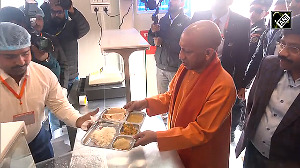While one chair presses ahead to further bridge gaps in the most difficult Doha agriculture negotiations, the other chair overseeing the negotiations to liberalise trade in industrial goods has suspended the talks by blaming the members for the impasse.
On Monday, the chair for Doha market access negotiations for industrial goods, Ambassador Don Stephenson, washed his hands of holding further meetings on the ground that members are not engaging.
However, the other chair overseeing the most difficult dossier of agriculture negotiations, Ambssador Crawford Falconer, today said he will press ahead with more consultations to further narrow gaps.
"I had got the impression from members that I need to convene more meetings to further narrow gaps in my text," Falconer, the chair for Doha agriculture negotiations, told Business Standard.
Last week, he created a small group called 'Walk in the Woods' to explore whether differences over special products and special safeguard mechanism between the exporters led by the United States on one side, and importers led by Indonesia and India on the other could be further narrowed down.
Falconer successfully brought down the number of unresolved issues, which are indicated in square brackets, to around 30 issues from a long list of 175 issues.
On the other hand, Stephenson, who is mired in one controversy or the other since July last year, repeatedly blamed members for lack of progress, maintaining that "nothing is achieved inside the negotiating group".
"It is time for members to take the responsibility and bridge their positions," Stephenson told reporters on Monday, adding "it is pointless for the chair to continue with the negotiations" at this juncture. "There is no further meeting until members signal that they have achieved some compromises which can be multilateralised," he added.
Privately, several countries blamed the Nama (non-agriculture market access) chair for creating the current mess in the Doha negotiations. "The problem with the Nama chair is that he thinks his way is the highway," said an Asian trade negotiator, suggesting that he had committed several blunders since last July.
Despite warning that things are going off the track in the Nama negotiations since September last year, the chair continued to persist with the mess he had created until the latest text issued on May 20 when he incorporated some of the suggestions made by many developing countries, said negotiators.
"There cannot be solutions overnight just because the Nama chair chose to include all the proposals in the latest draft," said a negotiator.
In a related development, several developing countries, including India, Brazil, South Africa, Indonesia and China among others, slammed the US proposal that called for participation in non-mandatory sectors to achieve the balance on the value of a coefficient, flexibilities and other relevant provisions.
The US and other industrialised countries want developing countries to enter into zero-for-zero tariff elimination in sectors such as chemicals, medical instruments and so on.
Many developing countries have opposed the sectoral tariff elimination, fearing heavy losses. They ridiculed the US' plan as an attempt to force sectoral negotiations on members in the eleventh hour to finalise modalities. China. for example, said the US proposal would make the negotiations worse off.
"Frankly, the chair must simply resign and vacate the place if he has no confidence in overseeing the process which is not the case in agriculture where members feel that things are done fairly," said another negotiator, arguing that though many countries have problems with the proposals in the agriculture text, there is a basis to negotiate.







 © 2025
© 2025